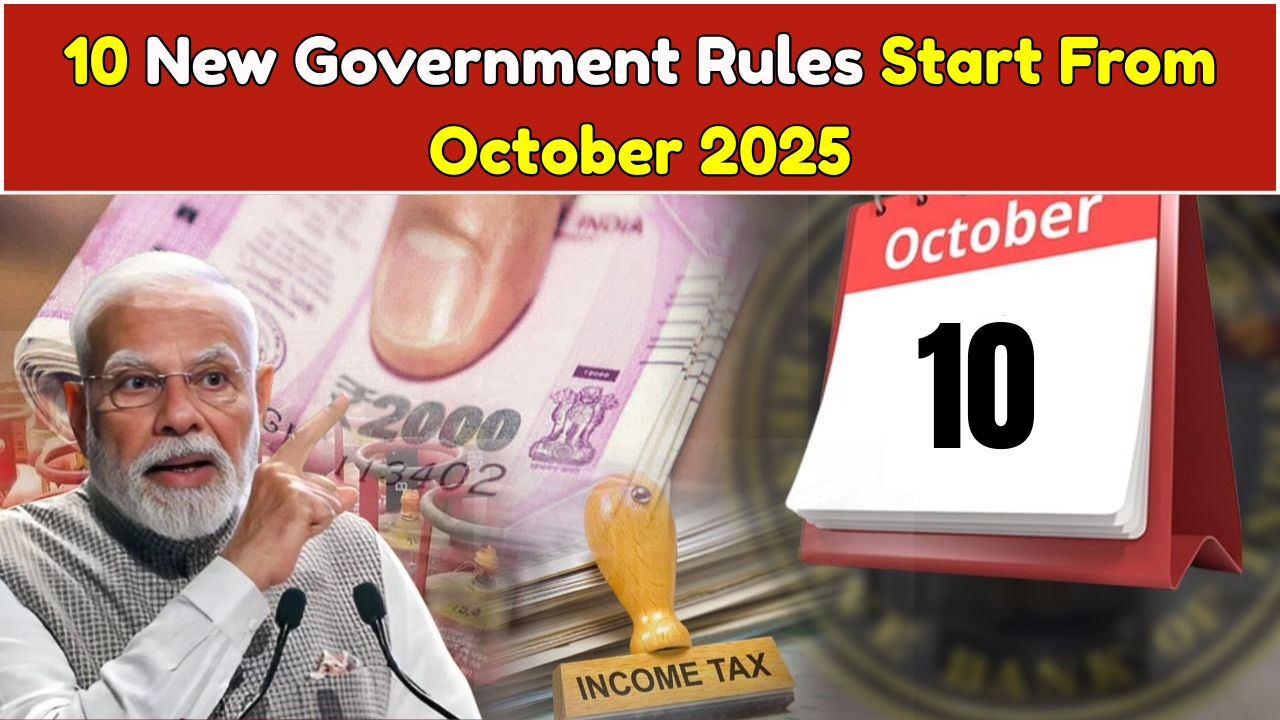Starting 1st October 2025, India is set to witness a slew of impactful regulatory changes affecting various facets of daily life and financial transactions.
These new rules promise to enhance transparency, consumer protection, and operational efficiency in sectors ranging from pensions and banking to digital payments, railway reservations, and online gaming.
As millions of citizens adjust to these updated regulations, understanding each rule’s scope, implications, and how it impacts individual convenience and security becomes vital.
This article offers an in-depth look at the 10 major new rules effective from 1st October, encompassing government reforms designed to modernize systems and safeguard public interests.
1. National Pension System (NPS) Overhaul
The NPS undergoes a paradigm shift with the introduction of a Multiple Scheme Framework. Non-government investors can now allocate 100% investments into equities and diversify across several schemes using a single PAN. This reform empowers investors with:
- Greater portfolio flexibility and risk management.
- Enhanced potential returns through equity exposure.
- Seamless fund management under unified taxation with a single identification number.
This change targets professionals, freelancers, and private sector subscribers seeking more control over their retirement savings with higher growth prospects.
2. RBI’s Continuous Cheque Clearing Initiative
Replacing the traditional batch-processing method, the Reserve Bank of India (RBI) inaugurates continuous cheque clearing from October 4, 2025, in phased implementation till January 2026. The benefits include:
- Real-time settlements and faster fund availability.
- Reduction in fraud and cheque-bounce delays.
- Improved banking efficiency enhancing customer experience.
This reform will drastically reduce cheque clearing timelines, impacting individuals and businesses alike.
3. Regulation of Online Gaming
To curb illegal gambling activities and safeguard the youth, India’s Promotion & Regulation of Online Gaming Act comes into effect, banning real-money betting and wagering apps. Crucially:
- Only e-sports and skill-based games will be permitted.
- Regulatory oversight ensures transparency and fair play.
- Protects vulnerable users from gambling addiction and financial losses.
This new law fosters a safer online gaming environment and fosters e-sports growth as a skill-based competitive sport.
4. UPI Transaction Security Enhancement
The National Payments Corporation of India (NPCI) discontinues the Peer-to-Peer (P2P) “collect request” or “pull” transaction feature. This longstanding option allowing merchants or payees to request money directly from bank accounts will be removed. Impact:
- Reduced risks of UPI fraud and unauthorised transactions.
- Emphasis on trusted payer-initiated transfers.
- Increased overall security in digital payments.
Users should adapt by moving to payer-authorised payment modalities such as “push” transactions.
5. Revised Bank Locker Agreements and Charges
Effective October 1, 2025, banks mandate updated locker agreements with customers in compliance with RBI norms. Simultaneously, service charges related to locker rentals, standing instruction failures, debit card issuance, ATM transactions, and salary accounts have been revised. This aims to:
- Enhance compliance and security standards.
- Cover rising operational and maintenance costs.
- Provide transparency in service terms.
Customers should review new charges and ensure updated agreements to avoid service disruptions.
6. IRCTC Ticket Reservation Norms
IRCTC implements stricter procedures for online train ticket bookings:
- The first 15 minutes of general quota bookings reserved exclusively for Aadhaar-verified genuine users.
- Agent and third-party bookings are restricted during peak hours.
- Faster booking, reduced ticket fraud and misuse.
These measures target curbing scalping and ensuring fair access to rail tickets for genuine passengers.
7. Increased Postal Service Tariffs with Security Upgrades
India Post’s speed post and parcel tariffs see a moderate revision from October 1, coupled with enhanced security measures:
- OTP-based verification for recipient delivery.
- Real-time parcel tracking systems.
- Improved courier reliability and transparency.
These changes aim to modernize postal services while balancing affordability for users.
8. NRI Restrictions on Public Provident Fund (PPF)
Non-Resident Indians (NRIs) are barred from opening new PPF accounts under revised rules. Existing accounts:
- Can neither be extended beyond maturity nor contribute further.
- Are allowed withdrawals as per existing rules until maturity.
The move aligns with government policy for optimizing domestic savings channels.
9. GST E-Invoicing Expansion
The GST Council expands mandatory e-invoicing thresholds on turnover slabs, capturing more businesses for compliance. As a result:
- Businesses with a turnover above a newly set limit must generate e-invoices.
- Streamlined tax filing, reduced evasion.
- Greater transparency in B2B transactions.
This reform increases the digital audit trail enhancing indirect tax administration.
10. Road Safety Fine Revisions
Several states have increased fines for traffic violations to instil better compliance:
- Higher penalties for speeding, drunken driving, helmet non-use, and signal violations.
- Increased enforcement powers for traffic officials.
- Efforts to reduce accidents and improve road discipline.
Citizens are urged to adhere strictly to road safety norms to avoid hefty fines.
Table: Summary of Major Rules Effective from 1 October 2025
| Area | Change/Rule Summary | Impact |
| National Pension System | 100% equity investment with single PAN allowed | Enhanced retirement savings |
| RBI Cheque Clearing | Continuous, real-time clearing replaces batch system | Faster cheque settlements |
| Online Gaming | Ban on real-money games; e-sports allowed | Safer gaming environment |
| UPI Transactions | Discontinuation of P2P collect requests | Reduced fraudulent transactions |
| Bank Locker Charges | New/revised fees and mandatory agreement updates | Increased transparency, compliance |
| IRCTC Ticket Booking | 15 minutes exclusive booking for Aadhaar-verified users | Fair ticket allocation |
| Postal Services | Tariff increase with OTP and tracking enhancements | Improved delivery security |
| NRI PPF Accounts | Ban on new accounts and extension of existing ones | Restricts NRI savings in PPF |
| GST E-Invoicing | Lower threshold for mandatory e-invoicing | Increased online tax compliance |
| Road Safety Fines | Increase in penalties for traffic violations | Improved road safety |
Conclusion
India’s new rules effective from 1st October 2025 manifest a comprehensive stride toward enhanced governance, user protection, and economic transparency.
Whether it is pension investments, banking improvements, digital payments, or transport reforms, these regulations are set to safeguard consumer interests, boost efficiency, and bring more convenience to daily transactions.
Citizens and businesses must stay informed and ready to adapt to the new compliance landscape to maximise benefits and avoid pitfalls. The collective goal remains a safer, fairer, and technologically advanced India equipped for future challenges.
Frequently Asked Questions (FAQs)
1. What is the major change in the National Pension System from 1st October 2025?
Non-government investors can now invest up to 100% in equity across multiple schemes using a single PAN.
2. How will RBI’s continuous cheque clearing impact cheque settlement?
Cheque settlements will happen in real time, reducing delays and improving fund access speed.
3. Which online gaming platforms are banned from October 2025?
Real-money betting and gambling apps are banned; only e-sports and skill-based games will be allowed.
4. What changes have been made to UPI transactions?
NPCI has discontinued the Peer-to-Peer “collect request” or pull transaction feature to reduce fraud.
5. How will IRCTC’s new booking rule help passengers?
The first 15 minutes of general ticket booking will be reserved for Aadhaar-verified users to curb ticket scalping and fraud.













